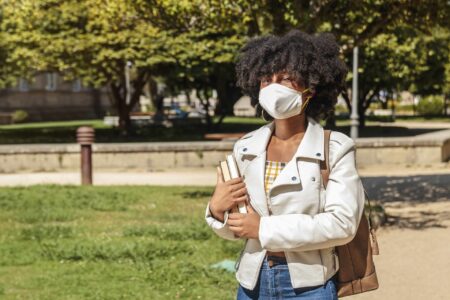Thanksgiving is traditionally an intimate gathering of family and friends. For college students, the fall break is an opportunity to go home to see the family for a few days. But with COVID-19 cases increasing at a high rate in some parts of the country (at the time this story was published, the United States had 10,168,019 cases, with more than a million added in the last seven days), you might want to rethink that trek home.
If you’re going home for the Thanksgiving holiday only and then going straight back to school, infectious disease specialists say this may not be a year to make that trip. This is especially true if your school is in the middle of an outbreak.
When weighing options for the holidays, start by thinking of the people you plan to visit.
Consider who you are going to be traveling to and if it’s really safe for you or for them. If family members have chronic health conditions—or if you so—weigh the risk of travel carefully.
If you do decide to make the trip, there are ways to reduce risk. Quarantine yourself for the two weeks before your trip to minimize the chance of bringing the virus with you, wear a mask and wash your hands regularly (or use a hand sanitizer that contains at least 60% alcohol).
If staying on campus isn’t an option, but you cannot self-isolate effectively for those 14 days, take all these measures very seriously. Once you’re home, wear a face mask for those first few days, even inside the house. This could keep you from getting everyone else sick.
Pay particular attention to hand hygiene. And maintain social distance distance, even though it might feel awkward.
Follow these tips to reduce the risk of contracting COVID-19 (or spreading it if you’re asymptomatic) when traveling by air, bus, train or car:
- Stay masked around others.
- Wash your hands frequently or use hand sanitizer (at least 60% alcohol).
- Maintain social distance of 6 feet from anyone who is not from your household.
- Avoid crowded areas.
- Avoid high touch surfaces, such as ATMs.
- Don’t touch your eyes, nose or mouth.
- Use disinfecting wipes on gas pump handles and buttons before you touch them (or put on gloves).
If you don’t feel well, have a fever or have been exposed to someone who has tested positive for COVID-19, don’t travel. Use the Centers for Disease Control Coronavirus Self-Checker for guidance to determine if you are a candidate to get tested for COVID-19 in your community.





